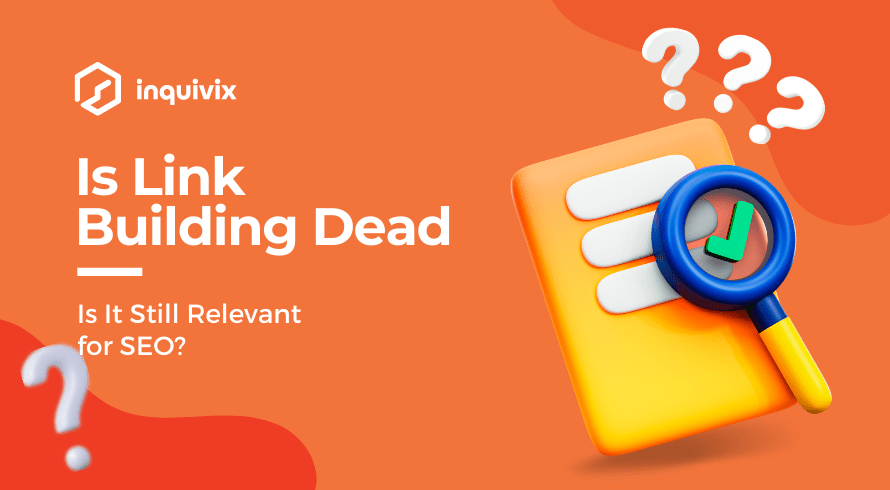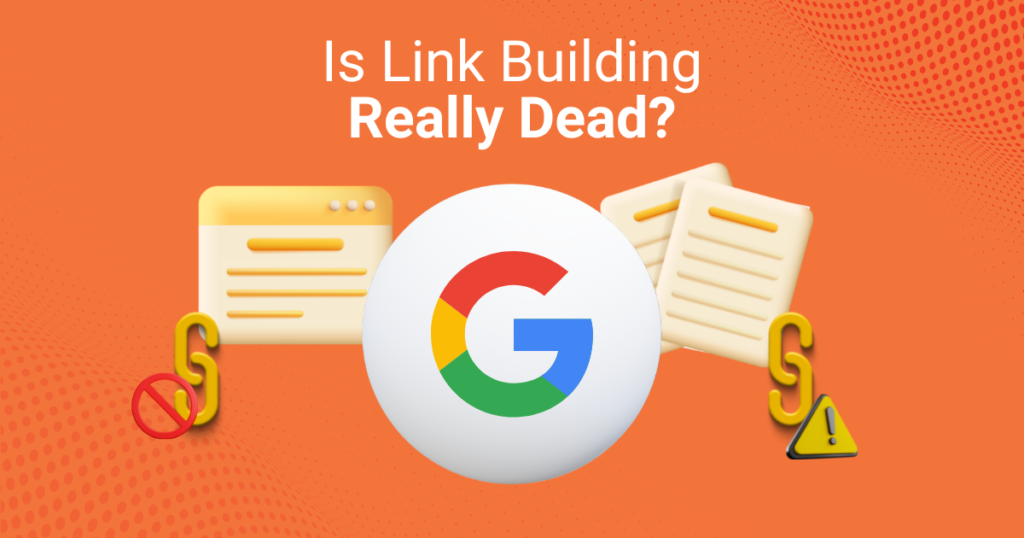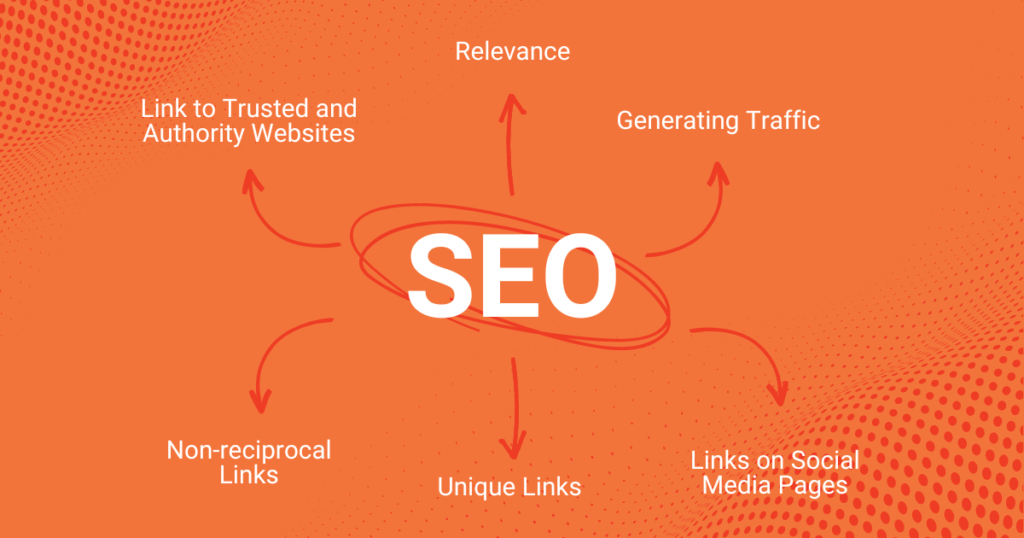Inquivix HQ
1-903, 18 Eonju-ro 146-gil,
Gangnam-gu, Seoul, Korea
06057

It’s no secret that the SEO landscape is constantly changing. What works today may not work tomorrow, and what was once considered a best practice may now be considered outdated or even spammy. So with all these changes happening, the big question on everyone’s mind is – is link building dead? And if it’s not dead, is it still relevant for SEO? In this blog post, we’ll take a look at the current state of link building and explore whether or not it will still be an important factor for SEO in the years to come.
What is Link Building?

Link building is the process of acquiring links from other websites to your own. Links are important because they are one of the factors that search engines like Google use to rank websites. A website with more inbound links is seen as more popular and more authoritative and therefore tends to rank higher in search results.
Link building can be a time-consuming and difficult process, but it is essential for anyone who wants their website to be successful. There are many different ways to build links, such as guest blogging, directory submissions, and social media outreach. Link building has been an important part of any search engine optimization strategy, and it has been a great way to improve a website’s visibility and organic traffic levels.
However, it’s important to remember that not all links are created equal. In order to get the most benefit from link building, you should focus on acquiring high-quality links from reputable websites. Additionally, you should avoid participating in link schemes or engaging in other black hat SEO practices, as this can lead to penalties from search engines.
The Evolution of Link Building
Over the past decade, link building has evolved significantly. In the early days of link building, the focus was on quantity over quality. The thinking was that the more links you had pointing to your website, the higher your page would rank in search engine results. As a result, a variety of link-building tactics were employed, including reciprocal links, directory links, and guestbook links. In addition, some webmasters resorted to paid link building, which involved buying links from other sites. However, this practice was quickly discredited when it was revealed that many of these links were actually spam.
Comment/forum spam and blog comments were also popular link-building tactics. These involved leaving comments on other websites with a link back to the commenter’s own site. Forum links were another common tactic, whereby webmasters would post links to their sites in forums hoping others would click on them. Guest posting was also a popular link-building tactic, whereby someone would write an article or blog post for another site in exchange for a link back to their own site. Finally, article directories were commonly used for link building. These allowed website owners to submit articles that included links back to their own sites.
Eventually, it became clear that some of these link-building practices were not effective in building high-quality links. In fact, many of them actually caused more harm than good. As a result, today’s link-building efforts focus on creating high-quality content and promoting it across the web. This is a far more effective way to build high-quality links that can improve your website’s search engine ranking.
As Google’s algorithm became more sophisticated, the importance of high-quality links began to be emphasized. Link builders now focus on earning links from reputable sources, such as well-known publications and industry leaders. They also work to create compelling content that naturally attracts links from other websites. As a result of these changes, link building has become a more strategic and sustainable way to improve organic rankings on search engines.
Is Link Building Really Dead?

There’s been a lot of debate recently about the role of link building in SEO. Some people have proclaimed that link building is dead, while others maintain that it’s still an important ranking factor. So what’s the truth?
It’s true that link building has changed. In the past, tactics like link farms and reciprocal linking were common, but those methods are now obsolete. Google’s webspam algorithm update, Penguin, has also had an impact on link building. Penguin punishes sites that engage in spammy link practices, so it’s important to make sure your links are high quality.
Despite all of these changes, link building is still one of the key ranking factors. That’s because links are essentially votes of confidence from other websites. The more high-quality links you have pointing to your site, the more likely you are to rank highly in search results. So if you’re serious about SEO, don’t give up on link building just yet.
What to Look For in SEO Link Building

If you’re serious about SEO, then you know that backlinks are important. But what makes a “good” backlink? Here are a few things to look for:
In order to build links for SEO, you will need to focus on creating content that is genuinely useful and interesting. This can be achieved through guest blogging, infographics, whitepapers, or even by writing high-quality blog posts. Once this content is created, link builders can reach out to other websites in their niche and offer to share it. If the content is good enough, they should have no trouble acquiring links from high-quality websites.
Characteristics of ‘Good’ or High-Quality Backlinks
Relevance
A relevant backlink is one that comes from a website that is in the same niche or industry as your own. For example, if you have a website about gardening, then a relevant backlink would come from another gardening website. This is because Google and other search engines view backlinks from relevant sites as votes of confidence. They assume that if somebody in your industry is linking to your website, then your content must be worth reading. On the other hand, if you have irrelevant links, you will lose your credibility and the website will suffer.
Link to Trusted and Authority Websites
In order for a link to be truly effective, it should come from a trusted and authoritative website. These are websites that are well-established, with a good reputation, and are frequently visited by users. They also tend to be popular within their niche or industry. A backlink from such a website is often seen as a vote of confidence, and can thus help to boost your own website’s ranking.
This type of link signals to search engines that your site is also trustworthy and deserving of a high ranking. The links from such high-quality websites tend to generate more traffic than links from lower-quality sites. This is because users are more likely to click on a link if they trust the source. For these reasons, it is important to focus on building links from trusted and authoritative websites. While it may take more time and effort to earn these types of links, the payoff will be worth it in the end.
Generating Traffic
One of the main factors that determine the quality of a backlink is the amount of traffic it generates. High-quality links are links that have been identified to be effective in increasing the number of visitors to a specific webpage or website. Backlinks that generate little to no traffic are usually considered low-quality.
Unique Links
When it comes to backlinks, quality is always better than quantity. A few high-quality unique backlinks from reputable websites will do more to improve your search engine ranking than a bunch of low-quality backlinks from less reputable sources. Generic or spammy links can actually harm your ranking, so it’s important to avoid them.
Non-reciprocal Links
Non-reciprocal links, also known as one-way links, are generally seen as being more valuable than reciprocal links. That’s because they’re a vote of confidence from one site to another, whereas reciprocal links can be seen as a way for two sites to try and trick the system.
Non-reciprocal links are also less likely to be discounted by Google, which has stated that it views reciprocal link-sharing with suspicion. As a result, non-reciprocal links are generally considered to be higher-quality backlinks than reciprocal ones. However, it’s worth noting that a few reciprocal links with trusted websites are not necessarily a bad thing. Indeed, if both sides are happy with the arrangement, then there’s no reason why reciprocal linking can’t be beneficial for both parties involved.
Links on Social Media Pages
Links from social media pages are often seen as high quality because they typically come from well-known and respected platforms. Social media platforms are a huge source of traffic for many websites, so links from these pages can also result in a significant boost in web traffic. Lastly, social media platforms offer unlimited backlinking opportunities, so you can continue generating links even after your website is established. Consequently, links from social media pages are an essential part of any backlinking strategy.
3 Effective Tips for Building Links
Let’s take a look at some useful tips for building links for SEO that you can utilize for your digital marketing campaigns.
Building Links with Infographics
One strategy that is always worth considering for link building is creating infographics. People love visual content, and an infographic can be a great way to present complex information in an easily digestible format. Plus, infographics are highly shareable, which means they have the potential to reach a wide audience. When creating an infographic, be sure to include a call-to-action that encourages people to share it on social media or embed it on their own website. With a little effort, you can create an infographic that will help you build links and drive traffic for years to come.
Fixing Broken Links
Another strategy you may want to consider is fixing broken links. This involves finding a broken link on a website in your niche or area of expertise and then producing new content to fill the vacancy. Once you’ve created your new material, contact the website’s owner and request that they replace the damaged link with a link to your work. But this strategy might be considered difficult as it has some potential drawbacks. One is that it can be a time-consuming process, even though it is an effective way to build links. Also, it’s important to note that website owners may not always respond to your outreach. So, it’s advisable to use this strategy with caution.
Guest Blogging
If you’re looking for a more direct way to build links, then guest blogging could be a good option. This involves writing articles for other websites in your niche in exchange for a link back to your website. Guest blogging is a great way to get your name and work out there in front of a new audience.
It’s important to prioritize quality and diversity. Guest blogging on a small number of high-quality and authoritative blogs is more effective than guest blogging on a large number of lower-quality blogs. Next, make sure to receive backlinks from more than one blog. This will help to diversify your link profile and improve your chances of ranking high on search engine results pages.
Build Your Link Profile with Inquivix
What will SEO look like in the future? It’s hard to say for certain, but we can make some educated guesses. Link building is likely still going to be a critical component of any successful SEO strategy. However, the way that links are built and acquired may change somewhat as search engines get better at deciphering their true value. Stay ahead of the curve by keeping up with the latest trends and changes in SEO, and don’t be afraid to experiment with new techniques – even if they seem a little bit outside the box.
As part of our SEO solutions, Inquivix we’ll do everything from backlink auditing and analysis to designing a link-building strategy and running link-building campaigns for you. Contact us now and we’ll help you with the rest!
Thank you for reading.
FAQs
Yes, backlinks are still considered a valuable ranking factor by most search engines. For a backlink to be truly valuable, though, it needs to come from a high-quality site that is relevant to your own. A link from a low-quality site or one that is not relevant to your site can actually hurt your search rankings.
Google’s webmaster guidelines say that they do not penalize paid links. However, if a site is caught selling links solely for the purpose of manipulating PageRank, it could be penalized. Paid links are sometimes difficult to distinguish from natural links, though, so it’s always best to be on the side of caution and avoid them altogether.
